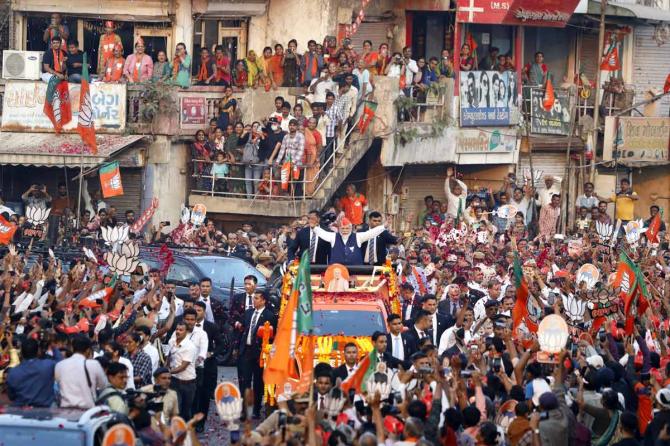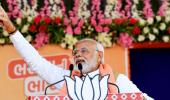On December 1, Modi led a 30-km-long roadshow through the city. His procession passed through 13 assembly constituencies of Ahmedabad.
On December 2, he led a 10-km roadshow from the Ahmedabad airport to Saraspur area as part of his whirlwind campaign.

Sixteen urban assembly seats in Ahmedabad city, which go to polls in the second phase of the Gujarat polls on Monday, are crucial for the Bharatiya Janata Party which has always enjoyed an upper hand in the elections since 1990.
While the Congress improved its tally to four seats in the 2017 election from two in 2012, the fight has become more interesting this time with the entry of the Aam Aadmi Party, which has fielded its candidates in all the 16 seats, and the All India Majlis-e-Ittehadul Muslimeen which is contesting four seats.
Political analysts claim the BJP, which currently holds 12 out of these 16 seats, will win most of them and the AAP may fail to make any impact.
The AIMIM is likely eat into the Congress's votes in some of the seats, they say.
With Prime Minister Narendra Modi holding two back-to-back roadshows in the city ahead of the second phase of polling which will cover north and central Gujarat, the 16 assembly seats in Ahmedabad city, considered a stronghold of the BJP, are once again in the spotlight.
On December 1, Modi led a 30-km-long roadshow through the city. His procession passed through 13 assembly constituencies of Ahmedabad.
On December 2, he led a 10-km roadshow from the Ahmedabad airport to Saraspur area as part of his whirlwind campaign.
Like other cities of Gujarat, voters of this bustling urban centre have been standing firmly behind the saffron party since the early 90s.
The city has two prominent seats -- Maninagar, from where Modi had contested thrice for the assembly membership from 2002 to 2014, and the Patidar community-dominated Ghatlodia which has given two chief ministers -- Bhupendra Patel and Anandiben Patel.
Despite the Patidar quota agitation in 2015, Bhupendra Patel won by a huge margin of 1.17 lakh votes in 2017.
The BJP has already announced he will be given the top post again after this election if it retains power in the state.
The Congress has fielded its Rajya Sabha member Dr Amee Yajnik from Ghatlodia.
The Maninagar constituency can easily be termed as the city's most high profile seat and a bastion of the BJP.
While Jamalpur-Khadia and Dariyapur seats are dominated by Muslims, at least six other seats - Ghatlodia, Thakkarbapa Nagar, Sabarmati, Maninagar, Nikol and Naroda - have a sizable number of Patidar community voters.
Vejalpur and Danilimda (SC) seats also have a considerable number of Muslim voters.
During the 2012 assembly polls, the BJP bagged 14 seats and the Congress got two seats -- Dariyapur and Danilimda.
In 2017, the Congress improved its tally to four seats -- Bapunagar, Jamalpur-Khadia, Dariyapur and Danilimda.
The Asaduddin Owaisi-led AIMIM had announced its candidates for these four seats and Vejalpur, but its Bapunagar candidate Shahnawaz Pathan withdrew his nomination, apparently in favour of Congress candidate.
This time, the Arvind Kejriwal-led AAP has fielded candidates in all the 16 seats in the city.
In 2017, Congress's Himmatsinh Patel defeated sitting BJP MLA Jagrupsinh Rajput by a thin margin of about 3,000 votes in Bapunagar.
Though the AIMIM candidate has withdrawn his nomination in favour of Himmatsinh Patel, there are chances the BJP may win back the seat this time due to the possible division of Congress votes, political analyst Dilip Gohil told PTI.
"Though the AIMIM is not in the picture, Samajwadi Party candidate Altaf Khan Pathan can still spoil Himmatsinh Patel's game through the division of Muslim votes and eventually help the BJP to bag the seat, which the Congress won by a narrow margin in 2017," he claimed.
The Muslim-dominated Jamalpur-Khadia seat may also see a turnaround in favour of the BJP, Gohil said.
Out of the nearly two lakh voters in the Jamalpur-Khadia constituency, Muslims are in the driving seat as they comprise about one lakh of the electorate, which makes it a tough nut to crack for the BJP.
In 2012, BJP candidate Bhushan Bhatt won the election apparently because of the division of minority votes between independent candidate Sabir Kabliwala and Congress's Samirkhan Pathan.
Kabliwala was appointed as the Gujarat AIMIM president a few months back.
Kabliwala, who a rebel Congressman, got around 30,000 votes, paving way for Bhatt's win by a thin margin of 6,300 votes in 2012.
Though he had made up his mind to contest as an independent in 2017 also, he withdrew his nomination at the last moment.
As a result, Congress candidate Imran Khedawala won with a comfortable margin of 29,000 votes in the last election.
This time, Kabliwala has been nominated by the AIMIM from the same seat, which many believe would result in a repeat of the 2012 scenario.
The Congress has re-nominated Khedawala and the BJP has reposed trust in Bhatt.
Gohil said Muslims will vote for Kabliwala, mostly because of his personal rapport and not because of the AIMIM's tag.
"There are huge chances he may cut the Congress's minority votes. We may see a repeat of 2012 this time and Bhatt might manage to sail through. AAP candidate Harun Nagori can also play a spoilsport for the Congress," he said.
Gohil also said not everything may be rosy for Bhatt because the picture can change if Hindu voters from the area do not turn up in considerable numbers to vote for him.
"The Hindus are unhappy because of some local issues regarding rules for repairing old houses. Some Hindu voters are also unhappy because of an alleged protection money racket going on in the area. Bhatt may also suffer if Hindus, who had gone elsewhere after renting out their properties here, do not turn up on the voting day," he said.
According to Gohil, the AAP will fail to leave any major impact on other seats and chances are high these seats will once again go to the BJP.
Out of the total 182 assembly seats in Gujarat, elections will be held on Monday in 93 seats, including 16 in Ahmedabad city.
Polling for the remaining 89 seats was held on December 1.
The counting of votes will be taken up on December 8.











 © 2025
© 2025